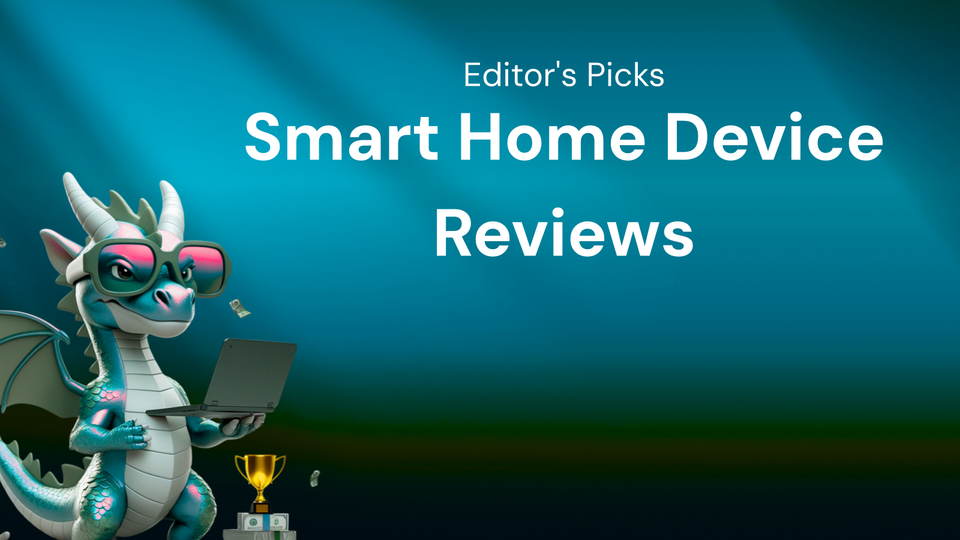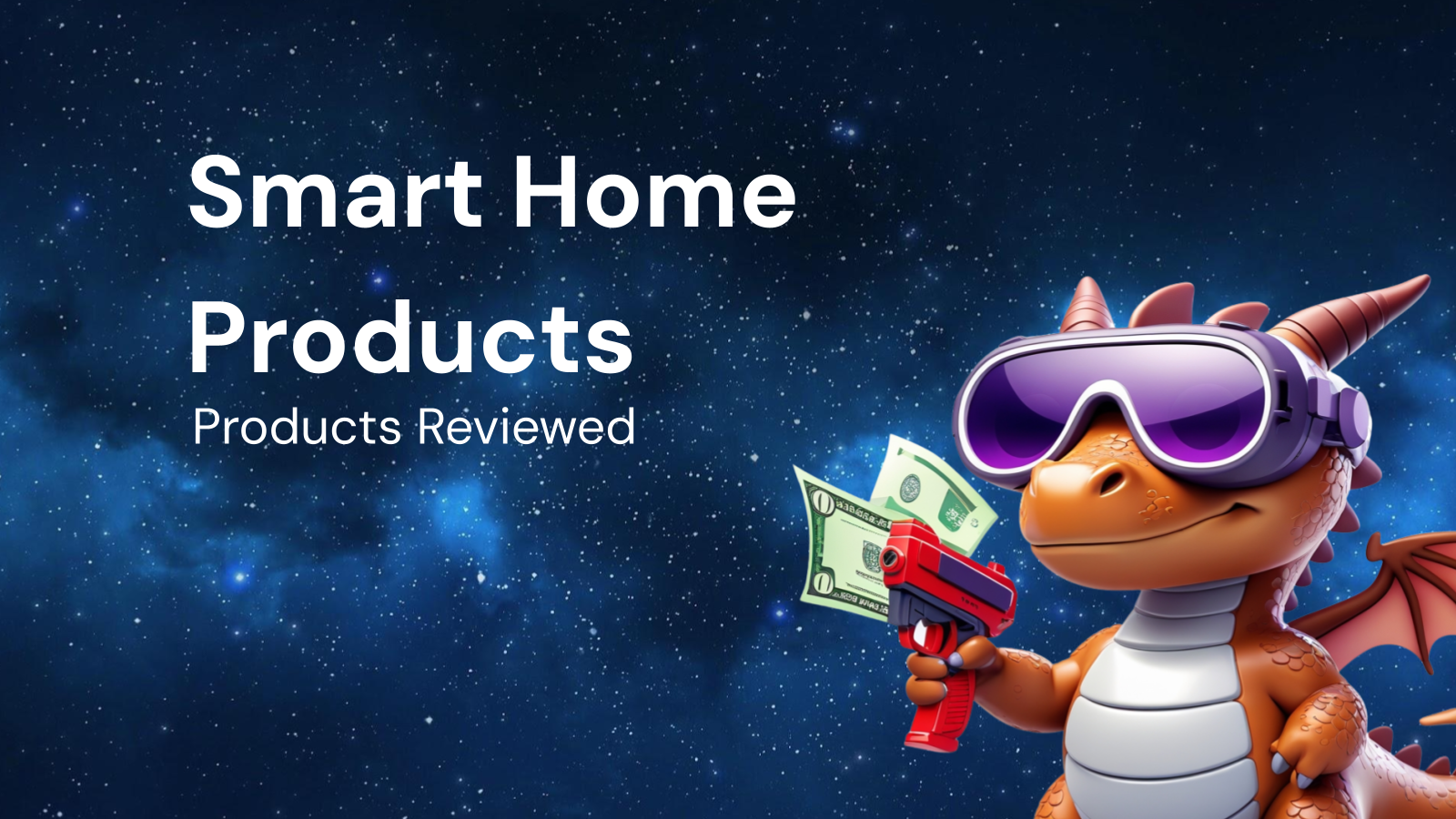Our Editor's Picks: Best Smart Home Device Reviews

Our Editor's Picks: Best Smart Home Device Reviews
The smart home revolution is in full swing, promising to automate our lives, enhance our comfort, and boost our security. But navigating the ever-expanding landscape of smart devices can feel overwhelming. From smart speakers and lighting to thermostats and security systems, the sheer volume of options can leave you feeling lost and confused. That's why our team of editors has tirelessly tested and reviewed countless smart home devices to bring you our definitive list of the best on the market. These are the gadgets that have impressed us with their performance, reliability, ease of use, and overall value. Forget the marketing hype – these are the smart home devices that truly deliver on their promise.
Smart Speakers: The Voice-Activated Hub of Your Home
At the heart of many smart homes lies the smart speaker, acting as a central hub for controlling devices, answering questions, playing music, and much more. We've put several leading smart speakers through their paces, and these are our top picks:
- Amazon Echo (4th Gen): The All-Around Champion. Amazon's Echo lineup remains a dominant force in the smart speaker market, and the 4th generation Echo is a prime example of why. Its spherical design is a refreshing change from the cylindrical models of the past, and the improved audio quality delivers rich, immersive sound for music lovers. Alexa, the voice assistant powering the Echo, continues to be a powerhouse of information and control, seamlessly integrating with a vast ecosystem of smart home devices. We particularly appreciate its ability to act as a Zigbee hub, allowing direct connection with compatible smart lights and other devices, eliminating the need for additional hubs.
- Pros: Excellent audio quality, seamless Alexa integration, built-in Zigbee hub, attractive design.
- Cons: Privacy concerns remain a factor for some users, Alexa can sometimes misinterpret commands.
- Google Nest Audio: Sound Quality Meets Smart Functionality. The Google Nest Audio focuses on delivering exceptional sound quality, making it an excellent choice for those who prioritize music playback. Google Assistant, the voice assistant powering the Nest Audio, is known for its conversational abilities and its deep integration with Google services like Calendar and Gmail. Its clean, minimalist design blends seamlessly into any décor. We were impressed with its ability to adapt its audio output based on the environment, ensuring optimal sound quality regardless of the room.
- Pros: Superior sound quality, advanced Google Assistant integration, sleek design, environment-aware audio.
- Cons: Lacks Zigbee or Z-Wave support, limited compatibility with some third-party smart home devices.
- Sonos One (Gen 2): The Audiophile's Smart Speaker. For those who demand the absolute best in audio quality, the Sonos One (Gen 2) is the clear winner. This speaker delivers unparalleled sound clarity and depth, making it a joy to listen to music on. While it supports both Alexa and Google Assistant, its primary strength lies in its multi-room audio capabilities. You can seamlessly connect multiple Sonos speakers throughout your home to create a synchronized audio experience. The Sonos app provides granular control over your audio settings and supports a wide range of streaming services.
- Pros: Exceptional audio quality, multi-room audio capabilities, support for Alexa and Google Assistant, Sonos app provides excellent control.
- Cons: Higher price point, less emphasis on smart home control compared to other options.
Smart Lighting: Setting the Mood and Saving Energy
Smart lighting is a cornerstone of any smart home, offering convenience, energy savings, and the ability to create personalized lighting scenes. We've explored a variety of smart lighting options, and these are our top recommendations:
- Philips Hue: The Gold Standard in Smart Lighting. Philips Hue remains the undisputed leader in the smart lighting market. Its extensive ecosystem includes a wide variety of bulbs, lamps, and light strips, allowing you to create the perfect lighting ambiance for any room. The Philips Hue Bridge acts as the central hub, connecting your lights to your Wi-Fi network and enabling control via the Philips Hue app. We particularly appreciate the seamless integration with other smart home platforms like Alexa, Google Assistant, and Apple HomeKit.
- Pros: Extensive ecosystem, excellent app control, seamless integration with other platforms, reliable performance.
- Cons: Requires a Philips Hue Bridge, higher price point compared to some competitors.
- Lifx: No Hub Required, Just Brilliant Color. Lifx stands out for its ease of installation. Unlike Philips Hue, Lifx bulbs connect directly to your Wi-Fi network, eliminating the need for a separate hub. This makes them a great option for those who want a simple and straightforward smart lighting solution. Lifx bulbs are known for their vibrant colors and impressive brightness. The Lifx app provides a user-friendly interface for controlling your lights and creating custom lighting scenes.
- Pros: No hub required, vibrant colors, easy to install, user-friendly app.
- Cons: Can be less reliable than hub-based systems, may experience connectivity issues in areas with poor Wi-Fi signal.
- Wyze Bulb Color: Budget-Friendly Smart Lighting Without Compromise. For those on a budget, the Wyze Bulb Color offers an exceptional value proposition. These bulbs are surprisingly affordable, yet they deliver impressive performance and features. They offer a wide range of colors, adjustable brightness, and seamless integration with the Wyze app. While they don't offer the same level of integration with other smart home platforms as Philips Hue, they are a great option for those looking to dip their toes into the world of smart lighting without breaking the bank.
- Pros: Extremely affordable, wide range of colors, adjustable brightness, easy to set up.
- Cons: Limited integration with other smart home platforms, less reliable than more expensive options.
Smart Thermostats: Controlling Comfort and Saving Money
Smart thermostats offer precise temperature control, energy savings, and the convenience of remote access. We've tested a range of smart thermostats, and these are our favorites:
- Nest Learning Thermostat: The Smartest Thermostat on the Market. The Nest Learning Thermostat is known for its sleek design and its ability to learn your heating and cooling preferences. It automatically adjusts the temperature based on your schedule and your habits, helping you save energy without sacrificing comfort. Its built-in sensors can detect when you're away from home and automatically lower the temperature. The Nest app provides remote access and control, allowing you to adjust the temperature from anywhere.
- Pros: Learns your preferences, automatic temperature adjustments, energy savings, sleek design.
- Cons: Higher price point, requires a C-wire in some installations.
- Ecobee SmartThermostat with Voice Control: Feature-Rich and User-Friendly. The Ecobee SmartThermostat with Voice Control offers a wide range of features, including voice control via Alexa or Google Assistant, remote temperature sensors, and a user-friendly app. The remote temperature sensors allow you to monitor the temperature in different rooms of your home, ensuring consistent comfort throughout. We particularly appreciate the Ecobee's ability to integrate with other smart home platforms like Apple HomeKit.
- Pros: Voice control, remote temperature sensors, user-friendly app, integrates with other platforms.
- Cons: Requires a C-wire in some installations, less intuitive interface than Nest.
- Honeywell Home T5 Smart Thermostat: A Simple and Reliable Option. The Honeywell Home T5 Smart Thermostat offers a simple and reliable smart thermostat experience. Its user-friendly interface and straightforward scheduling options make it easy to set up and use. The Honeywell Home app provides remote access and control, allowing you to adjust the temperature from anywhere. While it doesn't offer the same level of advanced features as Nest or Ecobee, it is a great option for those who want a basic smart thermostat that is easy to use.
- Pros: Simple and reliable, user-friendly interface, affordable price point.
- Cons: Lacks advanced features like learning capabilities and remote temperature sensors.
Smart Security Systems: Protecting Your Home and Loved Ones
Smart security systems provide peace of mind by monitoring your home for intruders, fires, and other emergencies. We've evaluated a variety of smart security systems, and these are our top choices:
- Ring Alarm: The Best DIY Security System. Ring Alarm is a popular DIY security system that offers a comprehensive suite of features, including door and window sensors, motion detectors, and a base station with a built-in siren. The Ring app provides remote monitoring and control, allowing you to arm and disarm your system from anywhere. Ring also offers optional professional monitoring services, providing 24/7 protection for your home. We appreciate the Ring Alarm's affordable price point and its seamless integration with other Ring devices like video doorbells and security cameras.
- Pros: Affordable price point, comprehensive features, DIY installation, seamless integration with other Ring devices.
- Cons: Requires a subscription for professional monitoring, can be challenging to install for some users.
- SimpliSafe: A Simple and Reliable Security Solution. SimpliSafe is another popular DIY security system known for its simplicity and reliability. Its pre-configured packages make it easy to get started, and its wireless sensors are easy to install. SimpliSafe offers optional professional monitoring services, providing 24/7 protection for your home. We particularly appreciate SimpliSafe's no-contract policy, allowing you to cancel your monitoring service at any time.
- Pros: Simple and reliable, easy to install, no-contract policy, affordable professional monitoring.
- Cons: Fewer smart home integrations compared to Ring Alarm, less customizable than some other systems.
- Abode: A Feature-Rich and Customizable Security System. Abode offers a highly customizable and feature-rich security system. Its modular design allows you to build a system that meets your specific needs. Abode offers a wide range of sensors and accessories, including door and window sensors, motion detectors, glass break sensors, and water leak detectors. The Abode app provides remote monitoring and control, and Abode offers optional professional monitoring services. We appreciate Abode's robust integration with other smart home platforms like Alexa, Google Assistant, and Apple HomeKit.
- Pros: Highly customizable, wide range of sensors and accessories, robust smart home integrations, optional professional monitoring.
- Cons: Higher price point compared to Ring Alarm and SimpliSafe, can be more complex to set up.
Beyond the Basics: Other Smart Home Devices Worth Considering
While smart speakers, lighting, thermostats, and security systems are essential components of any smart home, there are many other smart devices that can enhance your life. Here are a few of our favorites:
- Smart Plugs: Smart plugs allow you to control any electrical device with your smartphone or voice assistant. You can use them to turn lamps on and off, control appliances, and even monitor energy usage.
- Smart Door Locks: Smart door locks provide keyless entry, remote locking and unlocking, and activity monitoring. You can use them to grant access to guests, track who enters and exits your home, and even receive alerts when your door is unlocked.
- Smart Video Doorbells: Smart video doorbells allow you to see and speak to visitors from anywhere in the world. They also record video footage of your doorstep, providing an extra layer of security.
- Smart Sprinkler Controllers: Smart sprinkler controllers automatically adjust your watering schedule based on weather conditions, helping you conserve water and save money.
- Robot Vacuums: Robot vacuums automate the task of vacuuming your floors, freeing up your time for other things.
Conclusion: Building the Smart Home of Your Dreams
The smart home revolution is transforming the way we live, offering unparalleled convenience, comfort, and security. By carefully selecting the right smart devices, you can create a home that is tailored to your specific needs and preferences. We hope that our editor's picks have provided you with valuable insights and inspiration for building the smart home of your dreams. Remember to do your research, read reviews, and choose devices that are compatible with your existing smart home ecosystem. With a little planning and effort, you can create a smart home that enhances your life in countless ways.




Comments ()